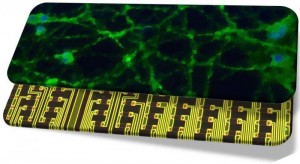“Interfacing electronics with life sciences”
Welcome !
Bioelectronics deals with the coupling of the worlds of electronics and biology, and this coupling can go both ways. The natural ability for “recognition” in the biological world, such as between two complimentary DNA strands, can be combined with the awesome power of microelectronics to process signals to build powerful new biosensors. At the same time, electronic devices can help “guide” biological events, for example cell growth, thereby creating new tools for biomedical research. This cross-fertilization between the two disciplines improves our understanding of life processes and forms the basis for advanced disease detection and treatment. Tools generated in this arena, such as medical diagnostics and brain implants, will dominate the future of healthcare and help increase the span and quality of our lives. They will also play a dominant role in modernizing agriculture and in protecting animal health, our food supply, and the environment.

Key to these new technologies is a fundamental understanding of the interface between electronic materials and biology. Organic electronics – an emerging technology that relies on carbon-based semiconductors and promises to deliver devices with unique properties – seems to be ideally suited for the interface with biology. The “soft” nature of organic materials offers better mechanical compatibility with tissue than traditional electronic materials, while their natural compatibility with mechanically flexible substrates suits the non-planar form factors often required for biomedical implants. More importantly, their ability to conduct ions in addition to electrons and holes opens up a new communication channel with biology. Our Department combines expertise in organic electronics and biology. Our research aims to elucidate the fundamentals of the electronic materials/biology interface and to launch new bioelectronic technologies.
On behalf of our faculty, staff and students, I welcome you to our Department’s webpage and hope that you will enjoy your visit.
David Moreau
Head of the Department of Bioelectronics
david.moreau@mines-stetienne.fr
Selected Stories
For more stories, follow us on twitter: @esma_ismailova (Esma Ismailova), @neurophoton (Rod O’Connor).
“The inside story on wearable electronics“.
On integrating biology and engineering (in French).
Video: Our laboratory on TV3 for an award from the French Foundation for Epilepsy Research (in French).
The Wall Street Journal highlights our research on neural interfaces.
Video: Our laboratory on TV3 for the development of new probes for electrophysiology (in French).
Video: Learn about our OECT sensors in the Journal of Visualized Experiments.
Recent News
Welcome to Lucas Teolis, joining BEL as a PhD student (Dec 2024)
Congratulations to Dr Nathan Dumas, for defending her PhD thesis (Nov 2024)
Welcome to Asma Benyahia, joining BEL as a PhD student (Oct 2024)
Congratulations to Dr Amélie Albon, for defending her PhD thesis (Sep 2024)
Welcome to Wei-Ting Ting, joining BEL as a postdoctoral fellow (Jun 2024)
Congratulations to Dr Rita Matta for defending her PhD thesis (May 2024)
Welcome (back) to Aimie Pavia, joining BEL as a postdoctoral fellow (Mar 2024)
Welcome to Dimitri Ducrocq, joining BEL as a PhD student (Feb 2024)
Welcome to Manar Gani, joining BEL as an engineering student intern (Jan 2024)
Welcome to Matias Ceballos, joining BEL as a PhD student (Jan 2024)
Congratulations to Dr. Rémy Cornuejols, for defending his PhD thesis. (Dec 2023)
Welcome to Jules Mercier, joining BEL as a PhD student (Nov 2023)
Congratulations to Dr. Marina Galliani for defending her PhD thesis. (Sep 2023)
Congratulations to Dr. Hajar Mousavi for defending her PhD thesis. (Jun 2023)
Welcome to Vincent Zitzelsberger, joining BEL as a bachelor’s intern (Apr 2023)
Welcome to Dr. Davide Reato, joining BEL as a postdoctoral fellow in collaboration with AMU-INT (Jan 2023)
Congratulations to Dr. Marie Lefèvre for winning 2nd Prize in the postdoc competition at WCE 2022 in Copenhagen, Denmark (Oct 2022)